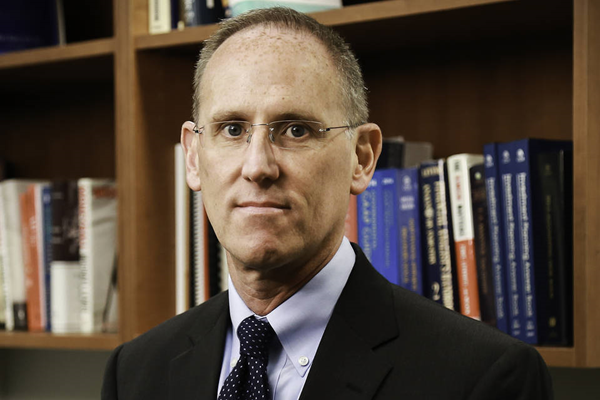THE
WALL STREET JOURNAL.
Risk & Compliance Journal
NYC Comptroller’s Office Counts on Active Shareholder Engagement
By
Mara Lemos Stein
Jan 8, 2018 3:00 am ET
|

Michael Garland, assistant comptroller for
corporate governance and responsible investing for the New York
City's Comptroller. PHOTO: NYC COMPTROLLER'S OFFICE |
The Office of the New York
City Comptroller serves as investment adviser and custodian for five
pension systems with holdings valued at $170 billion, with a majority
invested in passive instruments and index strategies. That doesn’t
keep it from being one of the most active asset owners in the U.S.,
according to Michael Garland, assistant comptroller for corporate
governance and responsible investing. In fact, he said the only way to
protect the portfolio’s value is to engage with companies for improved
governance. Mr. Garland talked about the value of proxy access, the
lessons of
Wells Fargo & Co.’s mishaps and
the limits of private ordering.
The comptroller has been at the
forefront of the push for proxy access in the U.S., as regulators have failed to
establish shareholder rights to nominate directors on a company’s proxy ballot.
Are there limits to shareholders’ ability to shape corporations through
proposals, the tactic known as private ordering?
Mr. Garland:
We didn’t want to do a lot of shareholder proposals because private ordering is
not the way to enact change in the markets…but it was clear there wasn’t
political appetite for a proxy access rule. We saw an opportunity to leverage a
particular capacity we had to file a lot of shareholder proposals.
We didn’t think it would be as successful so quickly…in a way,
private ordering did work. We are up to 450 companies with proxy access today,
from seven companies three years ago. But I worry that all of these bylaws that
are 10 pages long and have all sorts of clauses included means that companies
can easily change [the rules of proxy access].
Why does proxy access matter?
Mr. Garland:
It is a fundamental right that investors around the world have, and it’s
provided through regulation. It is also a very powerful right that would be
rarely used, but it would make boards more responsive, which is why investors
want it. There is an abundance of research that links good governance and
sustainable practices to higher stock-market values, and the CFA Institute
published a
study that shows proxy access would
increase investor wealth between 0.02% and 1.1%.
Because we launched the board accountability campaign publicly,
we created an event, and a statistics group within the Securities and Exchange
Commission did a
study that found that the campaign had an
abnormal positive impact on the market of 53 basis points. The fact that proxy
access is linked to value creation sends a message to the market.
The New York comptroller’s campaign
has entered a new phase, with board composition as its main focus for 2018. What
are you trying to achieve?
Mr. Garland:
We remain focused on board quality and composition. Over the past decade we
concentrated on board independence and accountability, but the conversation is
evolving. A key part of achieving the right balance on the
board is diversity. We are now pushing
companies to improve disclosure of gender and racial diversity so we can assess
not only the board’s skills and experience, but also its diversity.
How do you balance greater requests
for transparency with its attached costs? Is there a risk of asking too much?
Mr. Garland:
One investor might ask for things other investors don’t care about and you don’t
want the board to spend time on things that aren’t significant. But if investors
believe certain disclosures are important and material, then boards should be
managing them. If in fact boards are managing these issues, then information
exists and should be disclosed to investors.
We often ask companies to tell their story and to link it to the
strategy, and to put a little more of the information they may be already
disclosing in [annual reports] in the proxy. I don’t think it’s too much
disclosure—we want good disclosure that isn’t boilerplate and tells the
company’s story.
How do you look at corporate
culture?
Mr. Garland:
We think about it in two pieces, and let me take the problems at Wells Fargo as
an example. One is tone at the top, and how to try and encourage that. The
intention of our
clawback inititative was to set a tone at
the top for ethical conduct and compliance, although that isn’t something you
necessarily incentivize people to do because the expectation is that is the
baseline. As investors, we want to put a mechanism in place where individuals
are held accountable for misconduct. The big clawback may have sent a message to
others.
The other nexus of culture and another hot topic is human
capital. Wells Fargo was a failure of human capital management as much as a
compliance failure. One of the lessons is that boards need to think about how to
have oversight of human capital management. It doesn’t mean boards should be
setting pay structures for lower-level employees, but it’s unclear whether
boards are getting information about employee satisfaction, turnover,
whistleblower’s mechanisms.
Write to Mara Lemos Stein at
mara.lemos-stein@wsj.com.